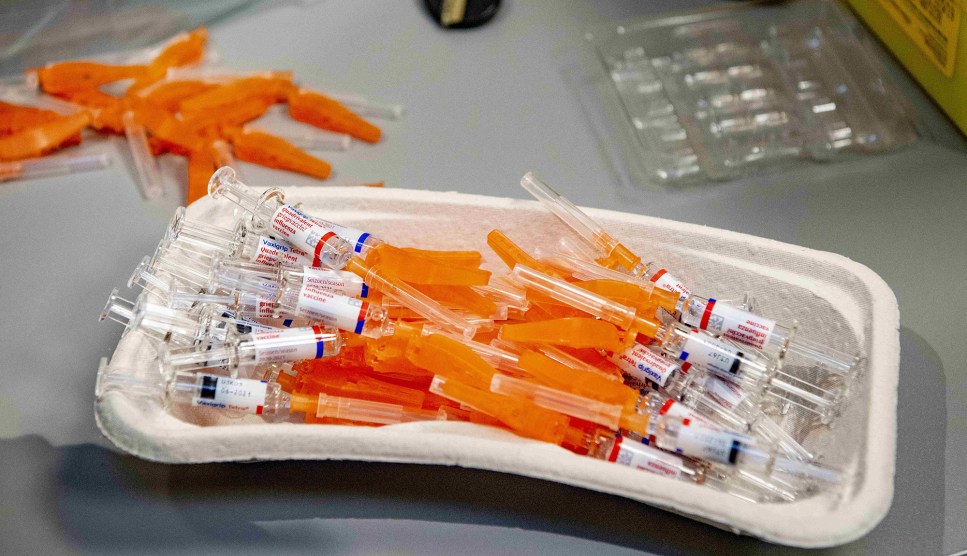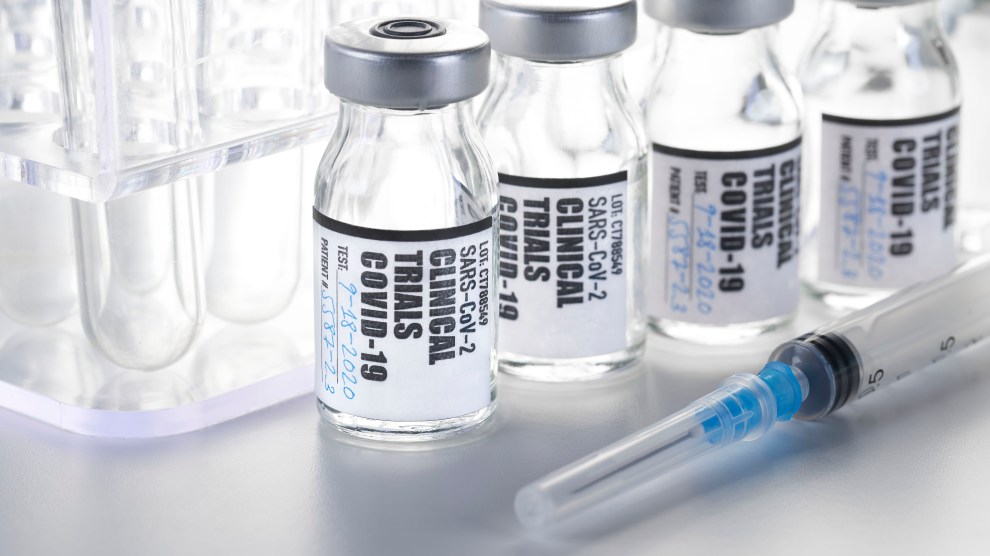
Mother Jones illustration; Larry D. Moore/Wikimedia Commons.
As the world grapples with the devastation of the coronavirus, one thing is clear: The United States simply wasn’t prepared. Despite repeated warnings from infectious disease experts over the years, we lacked essential beds, equipment, and medication; public health advice was confusing; and our leadership offered no clear direction while sidelining credible health professionals and institutions. Infectious disease experts agree that it’s only a matter of time before the next pandemic hits, and that one could be even more deadly. So how do we fix what COVID-19 has shown was broken? In this Mother Jones series, we’re asking experts from a wide range of disciplines one question: What are the most important steps we can take to make sure we’re better prepared next time around?
Vaccinologist and pediatrician Peter Hotez is the dean of the National School of Tropical Medicine at Baylor College of Medicine. In addition to his decades-long career studying and developing immunizations, Hotez has also written extensively about vaccine misinformation—he’s the author of the 2018 book Vaccines Did Not Cause Rachel’s Autism: My Journey as a Vaccine Scientist, Pediatrician, and Autism Dad. Since the start of the pandemic, Hotez has made frequent appearances on cable news, explaining the science of the virus in an accessible way while fighting for the cause of science itself. “I see the election as a triumph of science over anti-science,” he tweeted in the wake of the election. “Our nation is built on the backs of our great research universities that allowed us to achieve victory in WWII, go to the moon, defeat USSR in Cold War, treat HIV/AIDS. When POTUS tried to slaughter science, he was done.” Even so, Hotez warns that we’re headed into one of the most difficult times our nation has ever faced. We spoke about his hopes and fears as the Biden administration takes on this unprecedented challenge.
On Biden’s COVID-19 homeland-security problem: The country that Biden is going to inherit on January 20 could be in very bad shape. Some 400,000 Americans may have died by the week after the inauguration. Potentially, Biden could inherit a country that is overwhelmed. This will go beyond a public health problem—he will inherit a homeland security problem of incredible magnitude. We are in a very weakened state, and that is very dangerous when it comes to our adversaries. Our enemies could attack us at a very vulnerable point. The Murdoch media has created so much damage. I listen to myself and I sound like a crazy person, going on about Fox News and the Russian government. But all of this is real. We are in the middle of the most aggressive anti-science disinformation situation. Now you have people like Robert F. Kennedy, Jr. going to Berlin and speaking at anti-mask rallies.
On Biden’s competing priorities: We are entering one of the darkest periods in our nation’s history. Cases are going to accelerate, and ICUs are filling up. What does the president do on day one as he inherits this collapse? He needs to make an assessment on where we are with the epidemic. Are we still seeing surges in ICUs? Can he work with governors on stronger measures, like mask mandates? Can he up our level of production of PPE and ventilators? Are we going to need new vaccines with more traditional technology? Operation Warp Speed went right to the cutting-edge technologies, and while the innovation is exciting, it’s also added an extra element of risk. We have been pushing Operation Warp Speed to embrace more traditional methods, as well.
On how to restore American trust in vaccines: The low acceptance of COVID-19 vaccines is the product of several forces in the Trump administration. Operation Warp Speed never had a communications plan. They left all communications to the pharma CEOs, who fumbled the message with inside trading and clinical pauses. Then, the anti-science movement really flourished. The “health freedom” and “medical freedom” movements shifted the whole anti-vaccine movement right. Then, in 2020, it expanded into protests against masks and contact tracing. Then you had the misinformation campaign from [White House coronavirus adviser] Scott Atlas, not to mention Russian anti-science messaging. This is a mess. Fine-tuning the message won’t be enough. We need to begin dismantling the anti-science and anti-vaccine empire. We’re going to need a task force to do that—people from Homeland Security, Justice, and Commerce. How can we pull on levers to make that happen?
On what’s wrong with the CDC: We need to better understand what went so terribly wrong at the Centers for Disease Control—why they missed the entry of the virus, why the agency was invisible in creating a response, and how much of that was internal failings as opposed to meddling by the White House. I was very disappointed by the House Select Subcommittee’s handling of the CDC. They asked silly and irrelevant questions, so I don’t know if Congress can uncover what went wrong. I think all the leaders, including Redfield, will be gone pretty soon. You need someone who knows how to communicate to the American people and how to do change management.
On the importance of ditching the “herd immunity” idea: The White House coronavirus task force approach was that there was no national response. So now, in the lame-duck session, we still won’t have a national response. Trump can still encourage people to defy masks and social distancing, and he can still put forward this stupid herd immunity idea. The current administration has made so many damaged goods. So many governors are now deeply defiant.
It’s not so much the ICU beds—what do we do about exhausted hospital staff? How do we bring in fresh replacements? I think it’s going to be an awful, awful winter. If you just use the Scott Atlas approach, we know the numbers. We’d be looking at 2 million deaths, not to mention all the long-term injuries. We can’t just give up and do nothing. We have to try. Biden is going to have to use the power of persuasion of the White House.
Image credit: Larry D. Moore, CC BY-SA 4.0, Wikimedia Commons.












